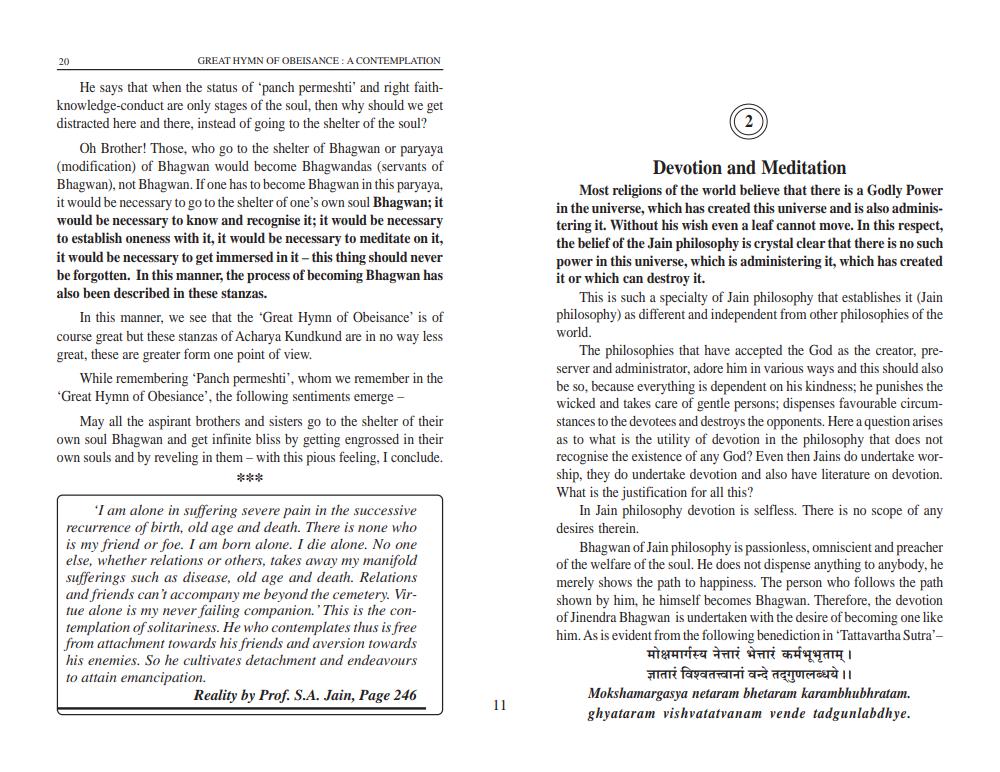________________
GREAT HYMN OF OBEISANCE: A CONTEMPLATION
He says that when the status of 'panch permeshti' and right faithknowledge-conduct are only stages of the soul, then why should we get distracted here and there, instead of going to the shelter of the soul?
20
Oh Brother! Those, who go to the shelter of Bhagwan or paryaya (modification) of Bhagwan would become Bhagwandas (servants of Bhagwan), not Bhagwan. If one has to become Bhagwan in this paryaya, it would be necessary to go to the shelter of one's own soul Bhagwan; it would be necessary to know and recognise it; it would be necessary to establish oneness with it, it would be necessary to meditate on it, it would be necessary to get immersed in it - this thing should never be forgotten. In this manner, the process of becoming Bhagwan has also been described in these stanzas.
In this manner, we see that the 'Great Hymn of Obeisance' is of course great but these stanzas of Acharya Kundkund are in no way less great, these are greater form one point of view.
While remembering 'Panch permeshti', whom we remember in the *Great Hymn of Obesiance', the following sentiments emerge -
May all the aspirant brothers and sisters go to the shelter of their own soul Bhagwan and get infinite bliss by getting engrossed in their own souls and by reveling in them - with this pious feeling. I conclude. ***
I am alone in suffering severe pain in the successive recurrence of birth, old age and death. There is none who is my friend or foe. I am born alone. I die alone. No one else, whether relations or others, takes away my manifold sufferings such as disease, old age and death. Relations and friends can't accompany me beyond the cemetery. Virtue alone is my never failing companion.' This is the contemplation of solitariness. He who contemplates thus is free from attachment towards his friends and aversion towards his enemies. So he cultivates detachment and endeavours to attain emancipation.
Reality by Prof. S.A. Jain, Page 246
11
2
Devotion and Meditation
Most religions of the world believe that there is a Godly Power in the universe, which has created this universe and is also administering it. Without his wish even a leaf cannot move. In this respect, the belief of the Jain philosophy is crystal clear that there is no such power in this universe, which is administering it, which has created it or which can destroy it.
This is such a specialty of Jain philosophy that establishes it (Jain philosophy) as different and independent from other philosophies of the world.
The philosophies that have accepted the God as the creator, preserver and administrator, adore him in various ways and this should also be so, because everything is dependent on his kindness; he punishes the wicked and takes care of gentle persons; dispenses favourable circumstances to the devotees and destroys the opponents. Here a question arises as to what is the utility of devotion in the philosophy that does not recognise the existence of any God? Even then Jains do undertake worship, they do undertake devotion and also have literature on devotion. What is the justification for all this?
In Jain philosophy devotion is selfless. There is no scope of any desires therein.
Bhagwan of Jain philosophy is passionless, omniscient and preacher of the welfare of the soul. He does not dispense anything to anybody, he merely shows the path to happiness. The person who follows the path shown by him, he himself becomes Bhagwan. Therefore, the devotion of Jinendra Bhagwan is undertaken with the desire of becoming one like him. As is evident from the following benediction in "Tattavartha Sutra'मोक्षमार्गस्य नेत्तारं भेत्तारं कर्मभूभृताम् ।
ज्ञातारं विश्वतत्त्वानां वन्दे तद्गुणलब्धये ।। Mokshamargasya netaram bhetaram karambhubhratam. ghyataram vishvatatvanam vende tadgunlabdhye.




